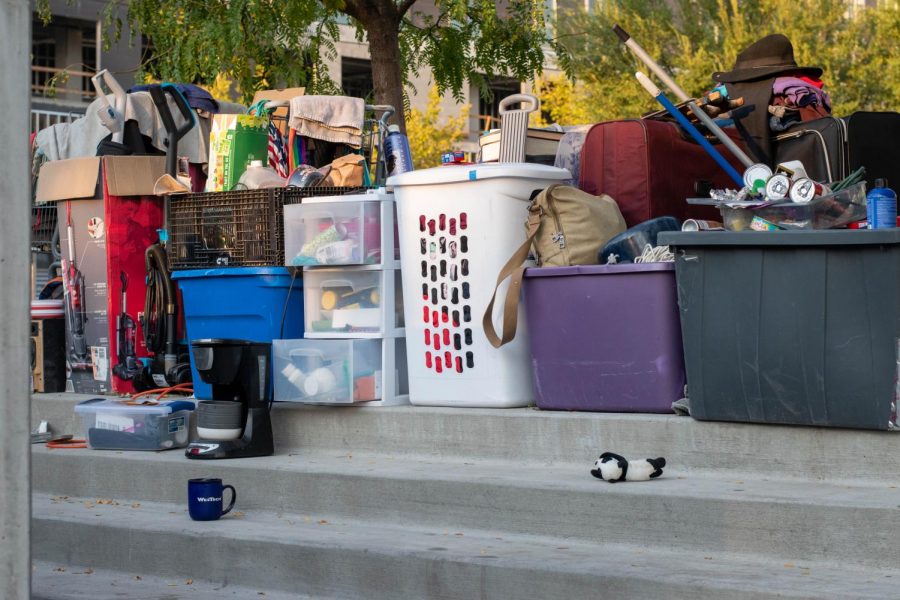McGrath: Caring for the Homeless is a Part of the Holiday Season
Belongings of an individual experiencing homelessness in Salt Lake City, Utah on September 21st, 2020. (Photo by Gwen Christopherson | The Daily Utah Chronicle)
November 27, 2020
Last year, City Creek mall assembled a typical view of Christmas time in Salt Lake City. I, among many other SLC residents, witnessed the festive scene. The Christmas lights shined while families and LDS missionaries wandered Temple Square. People bundled up in scarfs, mittens and winter coats gathered around choirs singing of “peace on earth and mercy mild.” Pamphlets titled “LIGHT THE WORLD” were passed around. A group of girls held their shopping bags full of fragrant perfumes and glimmering accessories on their way to dinner. What was not included in this picture-perfect Christmas celebration? That most of them crossed the street to avoid being near a man living on a tarp: starving and freezing next to the TRAX.
This is a typical scene in Salt Lake City year round — everyone in the frenzy of their lives while our neighbors are being forcefully removed from homeless camps to avoid gathering around downtown areas. Because homelessness isn’t good for tourism, you know. As one Columnist described her past behavior, we “pass by them, as if these human beings were mere growths on the sidewalk, going on with their lives as [we’re] going on with [ours].”
We need to get personal with homelessness. It’s shameful to be indulging ourselves at the mall while our neighbors are freezing across the street. As the holiday season nears, let’s look at ourselves and our perception of homelessness. Homelessness isn’t disappearing, we’re hiding from the reality of it. Hiding is not solving. We need to change our attitudes from Christmas savior to something that is sustainable for the entire year for our neighbors. City residents must be invested in addressing this problem as much as Utah officials.
Salt Lake City was once lauded as a leader in cities addressing homelessness. Utah officials claimed Utah was heading towards a “functional zero” amount of homelessness in 2015. This “drop” was attributed to Utah’s “Housing First” policy: focusing on housing people regardless of substance abuse or mental illness. However, the State of Utah’s 2018 Report on Homelessness found that the amount of unsheltered people has doubled since 2016. Why? Funding for an applauded and commended approach has dried up. The Housing First program needs to be better funded, especially when Utah suffers so disproportionately from opioid drug abuse. Advocating for people experiencing homelessness isn’t blaming the individual to “clean themselves up” and to “get a job.” This approach does nothing to solve the issue, only divides us further.
Forty percent of Americans are one paycheck away from poverty, and substance abuse was the single leading cause of homelessness in 68 percent of cities. Financial hardship and drug abuse are common — wages are low and the cost of living is rising dramatically. But laziness and motivational shortcomings are not the driving factors of homelessness. Utah’s Deseret News refers to homeless areas as “the new hotbed for drugs and on-street camping” as if these people are choosing to camp at Salt Lake City’s Library Square. No one chooses to be homeless.
“Light the World” is a term coined by the LDS church as an “invitation to transform Christmas into a season of service.” This is an excellent invitation for its members and SLC residents, but we need to do more than donate once every December. We need to realize addressing homelessness is more than donating — it’s addressing our drug and opiate crisis, too. We cannot “feel the Christmas spirit,” then condemn others for drug use when Utah has one of the highest prescription drug abuse per capita.
We cannot advocate for community health if it does not include the homeless population. It begins with educating ourselves on learned beliefs and prejudices towards homelessness. It’s advocacy for those suffering from poverty and drug addiction — it’s loving and supporting. This holiday season, let’s view charity as more than a token donation to forget about by New Year; it’s supporting policies like Housing First that houses humans before chastising for drug use.







